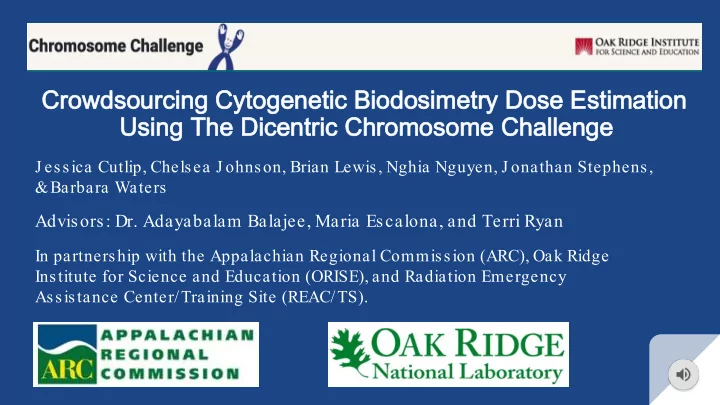

Crowdsourcing Cytogenetic Biodosimetry Dose Estimation Crowdsourcing Cytogenetic Biodosimetry Dose Estimation Using The Dicentric Chromosome Challenge Using The Dicentric Chromosome Challenge J essica Cutlip, Chelsea J ohnson, Brian Lewis, Nghia Nguyen, J onathan Stephens, & Barbara Waters Advisors: Dr. Adayabalam Balajee, Maria Escalona, and Terri Ryan In partnership with the Appalachian Regional Commission (ARC), Oak Ridge Institute for Science and Education (ORISE), and Radiation Emergency Assistance Center/Training Site (REAC/TS).
Cytogenetic Biodosimetry Lab (CBL) Team Dr. Adayabalam Maria Escalona Terri Ryan Balajee
REAC/TS & CBL Mission Statement: REAC/TS & CBL Mission Statement: ● Provide individual absorbed radiation dose estimate following occupational or accidental exposure using the “gold standard” dicentric chromosome assay ● Develop innovative biodosimetry techniques to effectively increase the rapidity of individual dose assessment in case of a radiological/nuclear mass casualty event
Introduction ● Radiological/nuclear mass casualty event ● Estimate dose via biodosimetry ● Guide medical professionals in taking appropriate medical interventions ● Dicentric Chromosome Assay (DCA) - Gold standard ● Dicentric Chromosome Challenge Game
Background: Ionizing Radiation & Dicentric Chromosomes
Background: Dicentric Chromosome Assay (DCA) Number of dicentric chromosomes ○ Background level 1 dicentric/1000 lymphocytes ○ Indicative of damage by ionizing radiation when higher ○ Existence of causes other than ionizing radiation
Background: Dicentric Chromosome Assay (DCA) ● Chromosomal ABerrations cAlculation Software (CABAS) for analysis ○ Aberrations Observed/Cells Scored ○ Quotient used in calibration curve to get estimated dose
Radiological/Nuclear Event Triaging Process Dose Estimate Information Utilized Dose Estimate Information Utilized 3 By Medical Professionals By Medical Professionals Dose estimate can guide medical professionals in their treatment decisions. Cytogenetic Biodosimetry Dose Cytogenetic Biodosimetry Dose 2 Estimation Estimation Current “gold standard” for measuring is the Dicentric Chromosome Assay. 1 Mass Casualty Event Mass Casualty Event ● Time-consuming ● Automation available Many individuals requiring medical attention
Method Method Materials and Methods Materials and Methods Materials ● Dicentric Chromosome Challenge game ● Google form survey ● Internet ready device
Chromosome Challenge Game
Result: Scored by Age ● 31% of individuals aged 41-50 scored 90% or Percentage of Participants above ● 12% of individuals aged 15-20 scored 90% or above ● Ages 21-30 and 31-40 had no desirable scores Age
Result: Scored by Gender ● Males had the highest success rate, Percentage of Participants with 24% scoring a 90% or above ● Only 5% of females scored a 90% or above Gender
Result: Scored by Background Education ● Individuals with backgrounds in Arts, Skilled Trades, and Business had the highest Percentage of Participants success rates, with 50% ● 12% of both individuals with science backgrounds and students still in high school scored 90% or above ● No individuals aside from those with backgrounds in the aforementioned categories scored above a 90% Education Background
Impact of Type of Device Used ● Individuals using a computer to play the game Percentage of Participants had higher overall success, with 13% scoring 90% or above and only 34% scoring below a 75% ● Tablet users had the least success with 0% scoring a 90% or above and 75% scoring below a 75% Type of Device
Success Rate by Number of Attempts ● The number of individuals scoring 75% or below Number of Participants decreased as the number of attempts increased ● The number of individuals scoring 90% or above increased as the number of attempts increased Number of Attempts
Ideal volunteer demographics: ● Aged 41-50 ● Male ● Background in art, trade skill, or business ● Computer user Data suggests with increased training, there is increased accuracy in identification of dicentric Conclusion chromosomes. Therefore, the Dicentric Chromosome Challenge could be used to train volunteers to correctly identify dicentric chromosomes and estimate radiation dose in the circumstance of a mass radiation event.
References Balajee, A. S., Escalona, M., Iddins, C. J., Shuryak, I., Livingston, G. K., Hanlon, D., & Dainiak, N. (2019). Development of electronic training and telescoring tools to increase the surge capacity of dicentric chromosome scorers for radiological/nuclear mass casualty incidents. Applied radiation and isotopes : including data, instrumentation and methods for use in agriculture, industry and medicine , 144 , 111–117. Balajee, A. S., Escalona, M., & Ryan, T. (2020). Cytogenetic Biodosimetry . ARC/ORNL Summer Institute, Oak Ridge, Tennessee, United States.
Recommend
More recommend